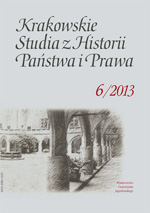O reformie prawa miejskiego w XVI wieku. Ciężkowicka uchwała o prawie prywatnym i administracji
On the reform of the municipal law in 16th century. Ciężkowice resolution on private law and administration
Author(s): Maciej MikułaSubject(s): Law, Constitution, Jurisprudence
Published by: Wydawnictwo Uniwersytetu Jagiellońskiego
Keywords: municipal law; Magdeburg law; laudum; wilkierz; king; inheritance law; law of obligations; administrative law; reception of law
Summary/Abstract: The change of written regulations of the municipal law, according to principles included in a gloss to the Magdeburg Weichbild and the Sachsenspiegel, required the consent of the town owner. In the case of towns belonging to the royal domain, the change required the king’s acceptance, in the form of approving the regulations prepared by the town burghers. Although the formal approval of the regulations made the king involved in the legislative process, his function cannot be understood as connected with any intentional legislative activity. As it turns out, the initiators of the changes in private law were the burghers themselves, who observed new legal solutions in other towns and, when the need arose, prepared projects of resolutions reforming the law. In smaller towns, this duty belonged to municipal scribes, who had to have an at least intermediate knowledge of law and, drawing on their professional practice, would point out the flaws and shortcomings in existing regulations. In the case of Ciężkowice resolution of 1550 and Biecz resolution of 1595, an interesting phenomenon can be observed, consisting in borrowing legal solutions, however, not mechanically, but to an extent that met the needs of the town community. The majority of the regulations in Biecz resolution was derived from the Cracovian laudum of 1530. The Biecz town statute (wilkierz), in turn, was a compilation of the Cracovian laudum and Ciężkowice resolution. It is an notable case of borrowing legal solutions from a city (i.e. Ciężkowice) with which Biecz remained in an economic conflict over nearly the whole 16th century. The Ciężkowice statute (wilkierz) abandoned the division of inherited property into gerada, hergewet and dziedzictwo, regulated the question of inherited debts after the Cracovian pattern, raised the problems of ius propinquitatis, and contained detailed administrative regulations, including those concerning the maintenance of the municipal school.
Journal: Krakowskie Studia z Historii Państwa i Prawa
- Issue Year: 6/2013
- Issue No: 3
- Page Range: 229-245
- Page Count: 17
- Language: Polish

